Opportunities for Application of Artificial Intelligence in Telecommunication Projects †
Abstract
1. Introduction
2. Application of Artificial Intelligence
2.1. AI in Telecommunications
2.2. AI in Project Management
- “Artificial intelligence in project management is the application of various techniques and methods based on computer algorithms that automate and optimize the processes of planning, execution and control of projects through data analysis and decision-making, capable of simulating human intellectual actions and provide analysis and forecasts for various aspects of project activities” [3].
- “Artificial Intelligence—this refers to the study of “intelligent agents”, autonomous non-human beings that can take in information from their environment and act on the environment in a way that allows them to succeed in their goals. Intelligent agents must have mastered machine learning and predictive data analytics aspects to be able to do this. In the project context, some people speculate that an intelligent agent could enhance or change the roles and status of many project professionals” [3,10].
2.3. Possibilities for the Application of Artificial Intelligence in Project Management
- Initiation/definition: Different AI applications in the initiation phase are used to identify projects, analyze project feasibility and define project objectives (strategic, tactical and operational).
- Planning: The use of AI in this phase of the project enables optimization of the project schedule, resource allocation, project cost planning, task prioritization and risk assessment.
- Implementation: AI applications support decision-making processes during project execution, resource management, including project human resources, resource demand forecasting and resource utilization optimization.
- Closing: The role of AI in this phase of the project is to evaluate the project, analyze the data needed to prepare a final project report and identify strengths and weaknesses of the project to benefit future projects.
- Monitoring and control: In this phase, AI allows real-time data analysis, project progress tracking and timely problem detection.
- Shared knowledge between stakeholders in the project (within the project team and outside it)—One of the key factors for the correct execution of projects is shared knowledge in the project teams. This is especially important for complex projects. The complexity of a project varies during the individual phases of the project life cycle; it is not a static quantity. The use of different methods of sharing knowledge and experience between project participants can lead to an increase in the quality and efficiency of the project. Such methods include regular meetings and training, mentoring and coaching and creating a system for the processes and lessons learned within the project to be useful to the project participants. Sharing knowledge, documents, information and resources is one of the most important factors when applying artificial intelligence in project management.
- Providing/receiving up-to-date/ongoing information—Information related to project progress should be supplied between team members without the need for interaction with the project manager. To this end, the role of artificial intelligence is in the form of a communication hub where everyone on the project team receives up-to-date information related to the project instead of the project manager.
- Improve communication—Specific AI applications such as chatbots and virtual assistants can facilitate communication within project teams by providing real-time updates, answering queries and scheduling meetings. This improves collaboration and ensures that team members have access to the right information at the right time.
- Analysis of large datasets—AI can be useful in analyzing large datasets. The various tools and applications of AI can be used both to process large datasets and to support complex decision-making and problem-solving processes. This, in turn, leads to the simplification of some processes that, without AI, take more time and effort.
- Prediction and derivation of trends—Through the analysis of large datasets using artificial intelligence, both from past projects and from current ones, future project results are predicted. Also, by examining various factors and their influence, AI allows for the prediction of project timelines, costs and required resources. This helps project managers make informed decisions and effectively allocate resources, as well as anticipate potential challenges and opportunities.
- Optimizing Resource Allocation—AI applications can optimize resource allocation by matching project requirements with project team members’ skills, expertise, experience and workload. This in turn leads to increased efficiency and productivity.
- Risk Management—AI enables the identification and mitigation of project management risks caused mostly by external factors (market conditions, regulatory changes, economic conditions, etc.). AI can recommend strategies to reduce and mitigate risks and avoid potential problems before they escalate. This proactive approach increases the sustainability of the project.
- Quality Control—AI can monitor project activities and deliverables to ensure compliance with quality standards and identify any deviations or defects early in the process. This helps maintain the overall quality of project deliverables and reduces the likelihood of rework or errors.
2.4. Some Challenges in Using Artificial Intelligence in Project Management
- Data privacy and security issues in AI-driven project management.
- Ethical considerations in decision-making and AI algorithms.
- Challenges related to workforce adaptation and potential job displacement.
- High short-term investment costs.
- High risk of long-term return on investment (ROI).
- Lack of trust in technology.
- Lack of experience with AI.
3. Methods
4. Results and Discussion
5. Conclusions
Funding
Institutional Review Board Statement
Informed Consent Statement
Data Availability Statement
Acknowledgments
Conflicts of Interest
References
- Markov, K. Artificial Intelligence in Higher Education—New Perspectives. In Proceedings of the Second National Conference Digital Transformation of Education—Problems and Solutions, Ruse, Bulgaria, 24–25 April 2024. [Google Scholar]
- Ozkan-Ozay, M.; Akin, E.; Aslan, Ö.; Kosunalp, S.; Iliev, T.; Stoyanov, I.; Beloev, I. A Comprehensive Survey: Evaluating the Efficiency of Artificial Intelligence and Machine Learning Techniques on Cyber Security Solutions. IEEE Access 2024, 12, 12229–12256. [Google Scholar] [CrossRef]
- Dacre, N.; Kockum, F. Artificial Intelligence in Project Management, A Review of AI’s Usefulness and Future Considerations for the Project Profession; Association for Project Management: Princes Risborough, UK, 2022. [Google Scholar]
- Barcaui, A.; Monat, A. Who is better in project planning? Generative artificial intelligence or project managers? Proj. Leadersh. Soc. 2023, 4, 100101. [Google Scholar] [CrossRef]
- Taboada, I.; Daneshpajouh, A.; Toledo, N.; de Vass, T. Artificial Intelligence Enabled Project Management: A Systematic Literature Review. Appl. Sci. 2023, 13, 5014. [Google Scholar] [CrossRef]
- Prifti, V. Optimizing project management using artificial intelligence. Eur. J. Form. Sci. Eng. 2022, 5, 29–37. [Google Scholar] [CrossRef]
- Auth, G.; Johnk, J.; Wiecha, D.A. A conceptual framework for applying artificial intelligence in project management. In Proceedings of the 2021 IEEE 23rd Conference on Business Informatics (CBI), Bolzano, Italy, 1–3 September 2021; pp. 161–170. [Google Scholar] [CrossRef]
- Kuster, L. The Current State and Trends of Artificial Intelligence in Project Management: A Bibliometric Analysis. Master Thsesis, Escola de Administraçao de Empresas de Sao Paulo, Sao Paulo, Brazil, 2021. [Google Scholar]
- Kotsev, E.; Stoycheva, B. Antecedents of individual innovativeness: Exploring gender, age and job nature. AIP Conf. Proc. 2024, 3063, 070008. [Google Scholar] [CrossRef]
- Project Data Analytics: The State of the Art and Science. Available online: https://www.apm.org.uk/resources/research/published-research/pda-pathfinder-report/ (accessed on 12 April 2024).
- Essential Ai in Project Management Statistics in 2023. Available online: https://blog.srive.co/ai-in-project-management-statistics/ (accessed on 12 April 2024).
- Bjorvatn, T.; Wald, A. Project complexity and team-level absorptive capacity as drivers of project management performance. Int. J. Proj. Manag. 2018, 36, 876–888. [Google Scholar] [CrossRef]
- Thamhain, H. Managing risks in complex projects. Proj. Manag. J. 2013, 44, 20–35. [Google Scholar] [CrossRef]
- Dimcheva, G.; Stoyanov, I. Challenges to the Application and Decision-Making using Artificial Intelligence (AI): Analysis of the Attitudes of Managers in Bulgarian Service Companies. In Proceedings of the 2023 4th International Conference on Communications, Information, Electronic and Energy Systems (CIEES), Plovdiv, Bulgaria, 23–25 November 2023; pp. 1–5. [Google Scholar] [CrossRef]
- Pospieszny, P.; Czarnacka-Chrobot, B.; Kobylinski, A. An effective approach for software project effort and duration estimation with machine learning algorithms. J. Syst. Softw. 2018, 137, 184–196. [Google Scholar] [CrossRef]
- Cubric, M. Drivers, barriers and social considerations for AI adoption in business and management: A tertiary study. Technol. Soc. 2020, 62, 101257. [Google Scholar] [CrossRef]
- Introduction to Project Management in Telecommunications. Available online: https://www.fishercom.xyz/project-management/introduction-to-project-management-in-telecommunications.html#download (accessed on 15 April 2024).
- Stoyanov, I. Opportunities and indicators for strategic development of leadership in mobile operators. Int. J. Inf. Models Anal. 2018, 7, 71–76. [Google Scholar]
- Barberis, J.; Arner, D.W.; Buckley, R.P. The RegTech Book: The Financial Technology Handbook for Investors, Entrepreneurs and Visionaries in Regulation, 1st ed.; John Wiley & Sons: Hoboken, NJ, USA, 2019. [Google Scholar]
- Ezeigweneme, C.; Umoh, A.; Ilojianya, V.; Adegbite, A. Telecom project management: Lessons learned and best practices: A review from Africa to the USA. World J. Adv. Res. Rev. 2023, 20, 1713–1730. [Google Scholar] [CrossRef]
- Dimcheva, G. Project Management in the Field of Telecommunications Services; University of Telecommunications and Post: Sofia, Bulgaria, 2022. (In Bulgarian) [Google Scholar]
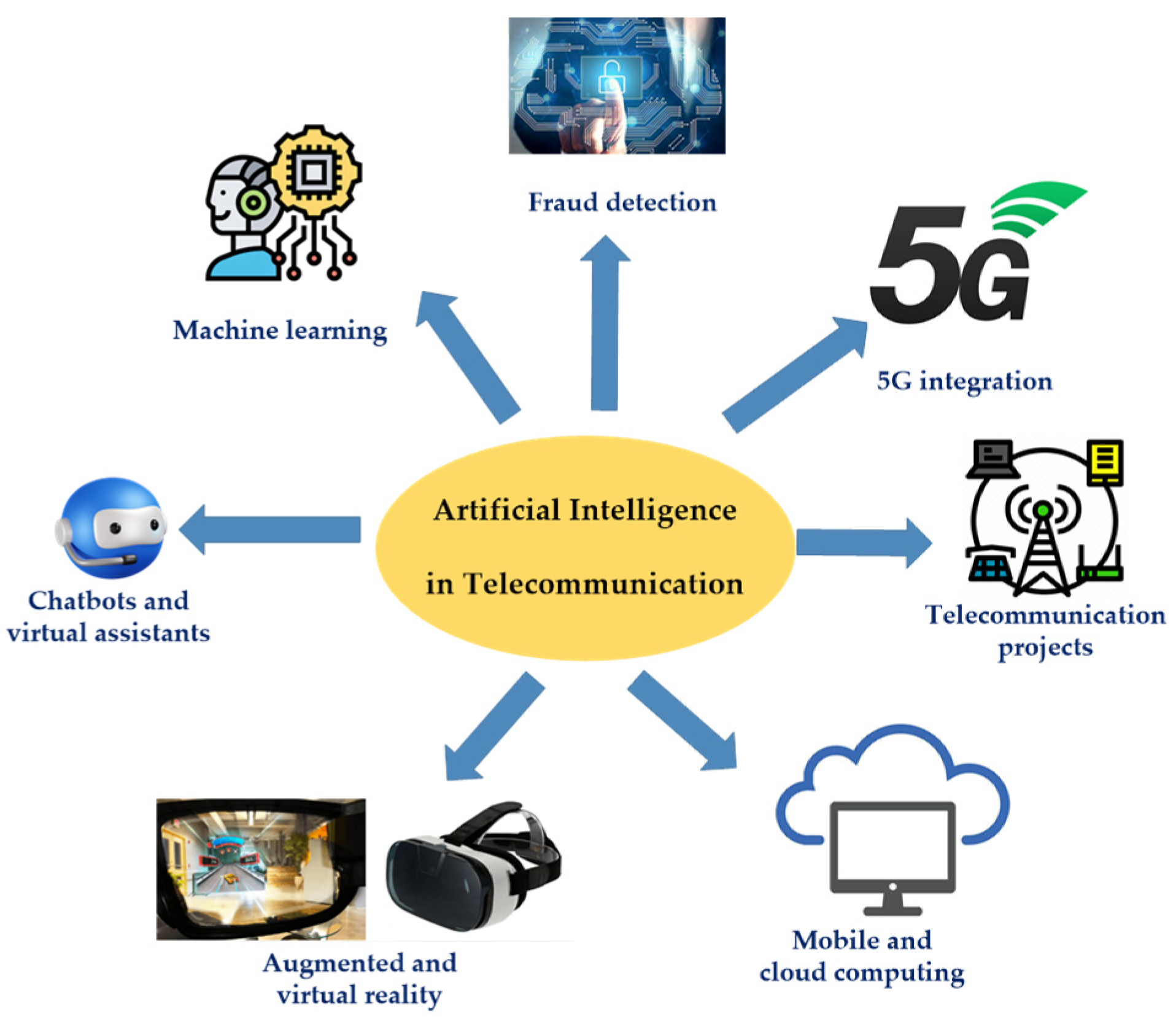
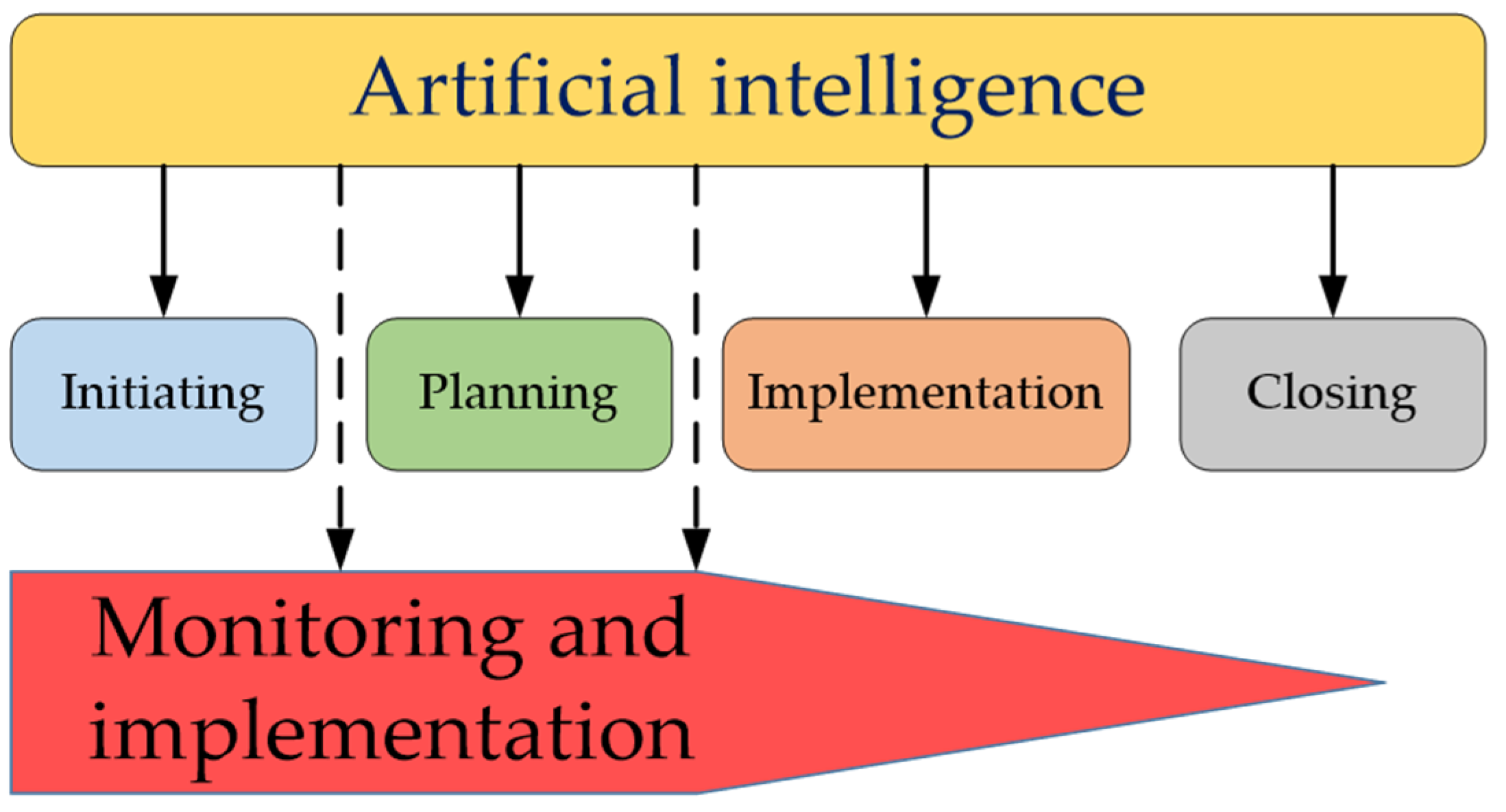
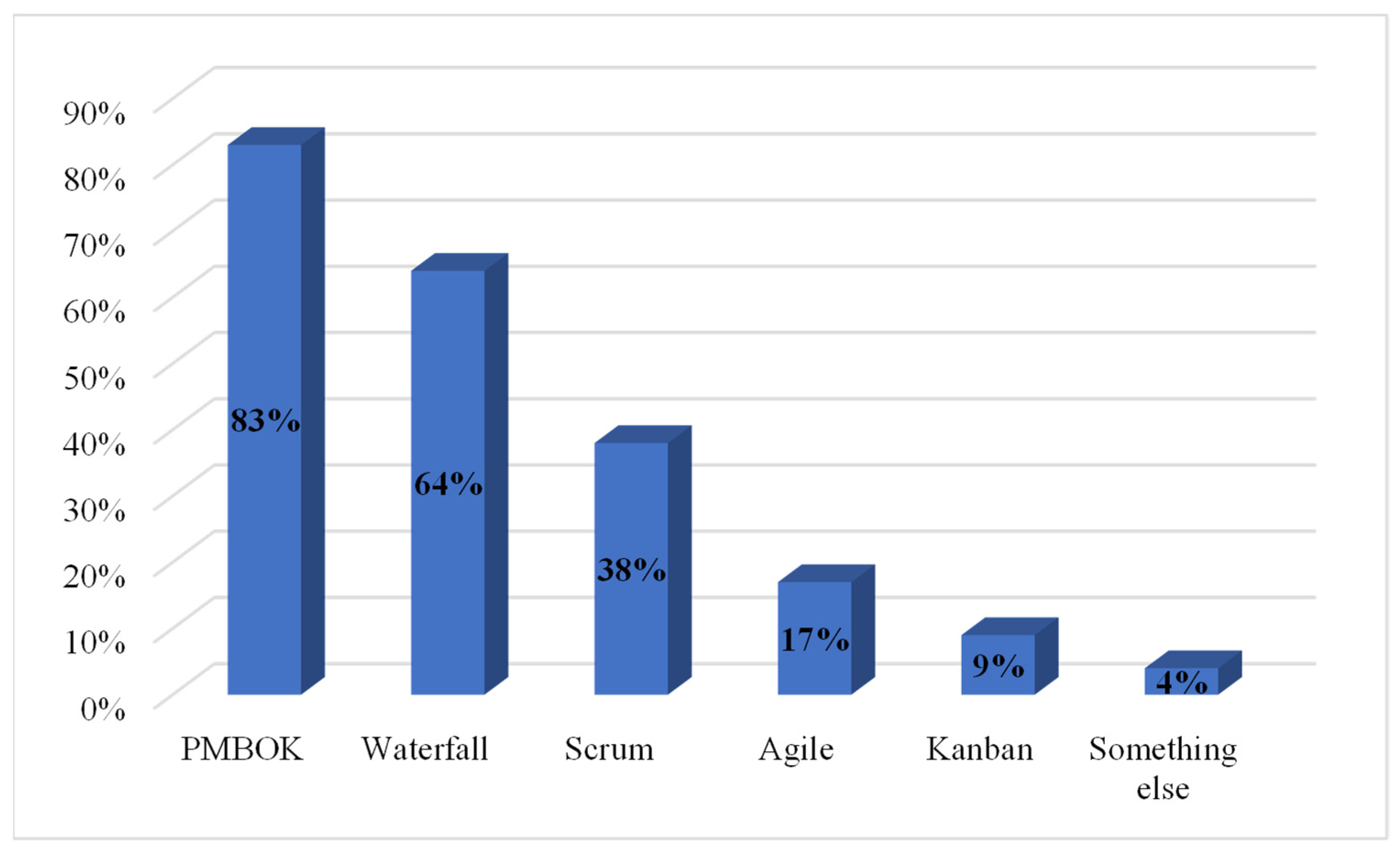
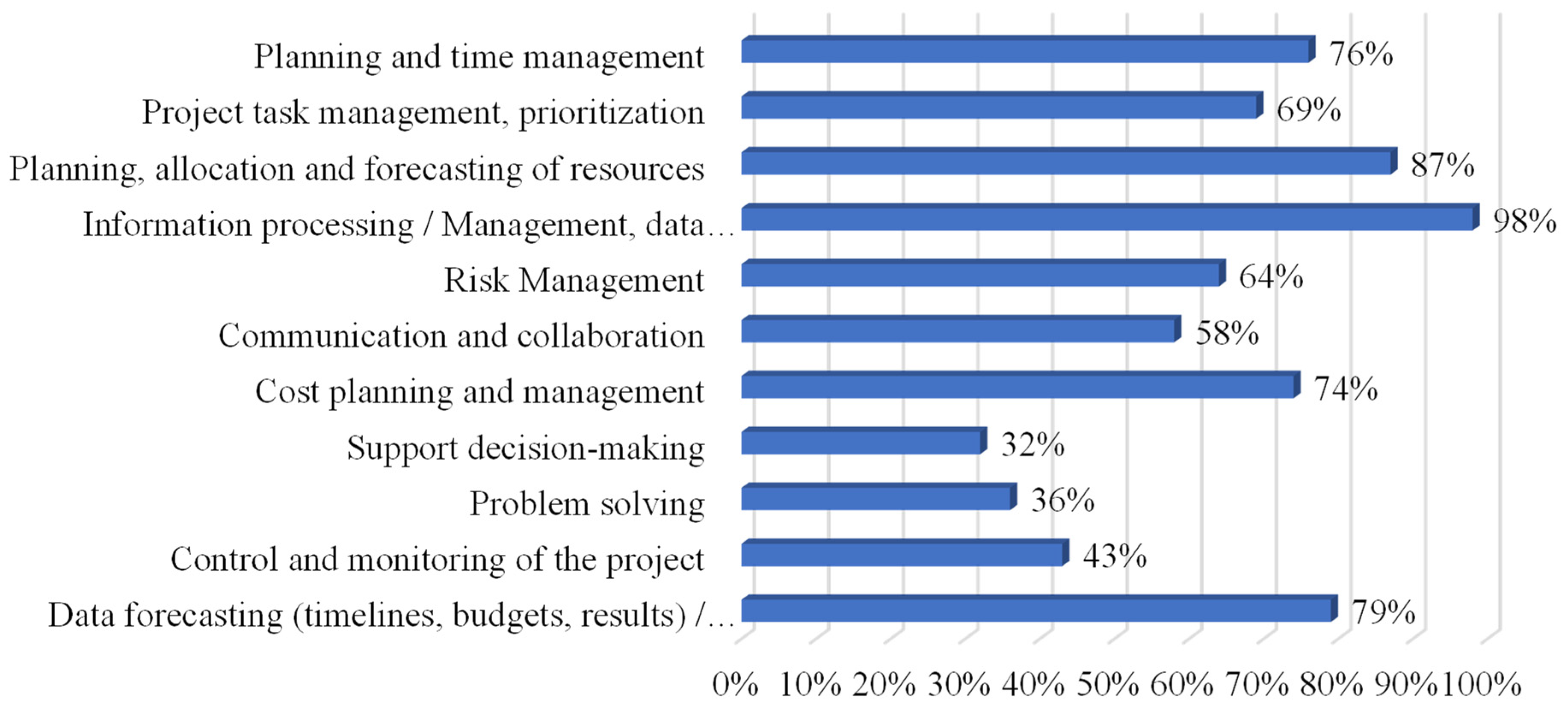
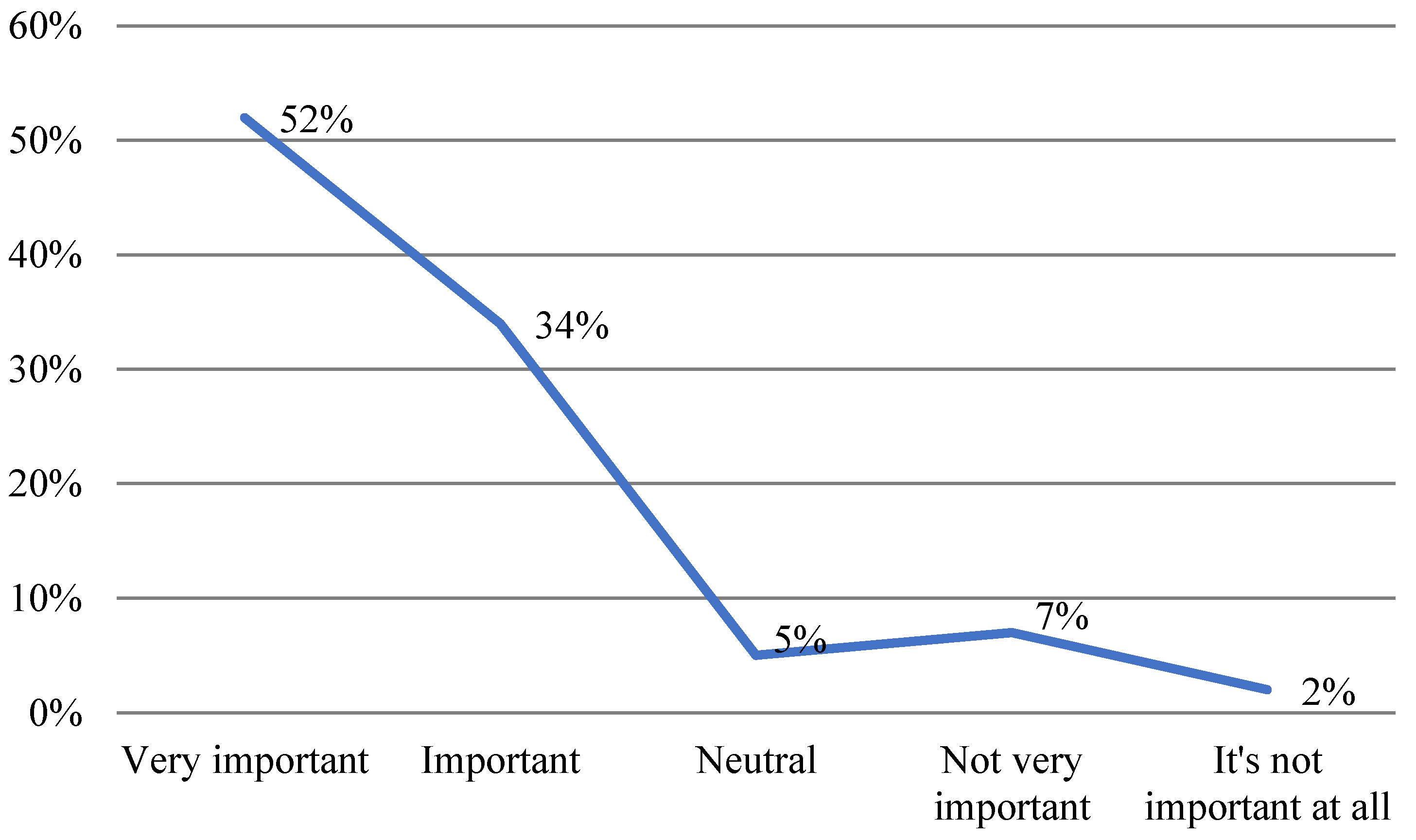
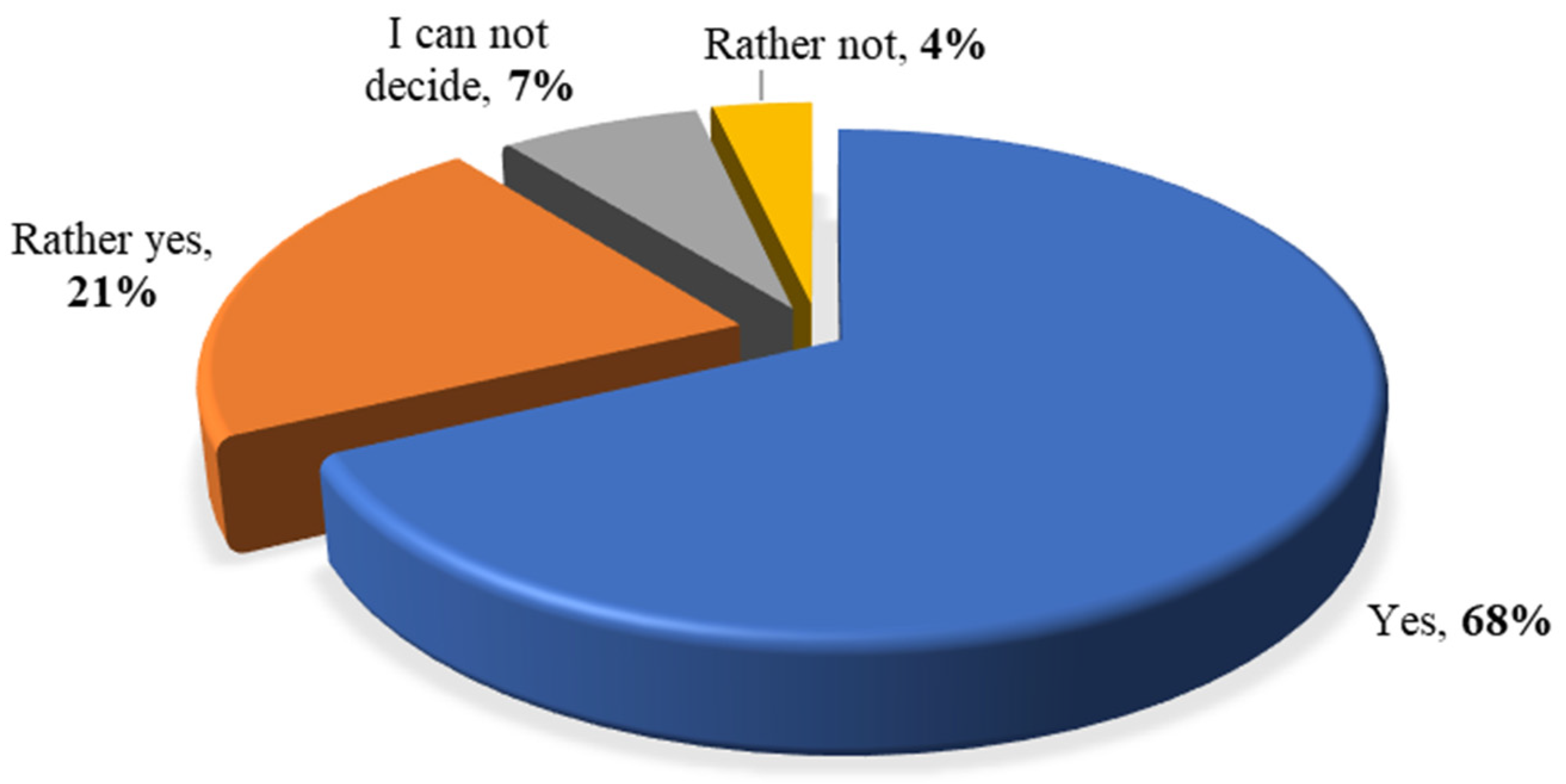
Disclaimer/Publisher’s Note: The statements, opinions and data contained in all publications are solely those of the individual author(s) and contributor(s) and not of MDPI and/or the editor(s). MDPI and/or the editor(s) disclaim responsibility for any injury to people or property resulting from any ideas, methods, instructions or products referred to in the content. |
© 2024 by the author. Licensee MDPI, Basel, Switzerland. This article is an open access article distributed under the terms and conditions of the Creative Commons Attribution (CC BY) license (https://creativecommons.org/licenses/by/4.0/).
Share and Cite
Dimcheva, G. Opportunities for Application of Artificial Intelligence in Telecommunication Projects. Eng. Proc. 2024, 70, 18. https://doi.org/10.3390/engproc2024070018
Dimcheva G. Opportunities for Application of Artificial Intelligence in Telecommunication Projects. Engineering Proceedings. 2024; 70(1):18. https://doi.org/10.3390/engproc2024070018
Chicago/Turabian StyleDimcheva, Gergana. 2024. "Opportunities for Application of Artificial Intelligence in Telecommunication Projects" Engineering Proceedings 70, no. 1: 18. https://doi.org/10.3390/engproc2024070018
APA StyleDimcheva, G. (2024). Opportunities for Application of Artificial Intelligence in Telecommunication Projects. Engineering Proceedings, 70(1), 18. https://doi.org/10.3390/engproc2024070018





